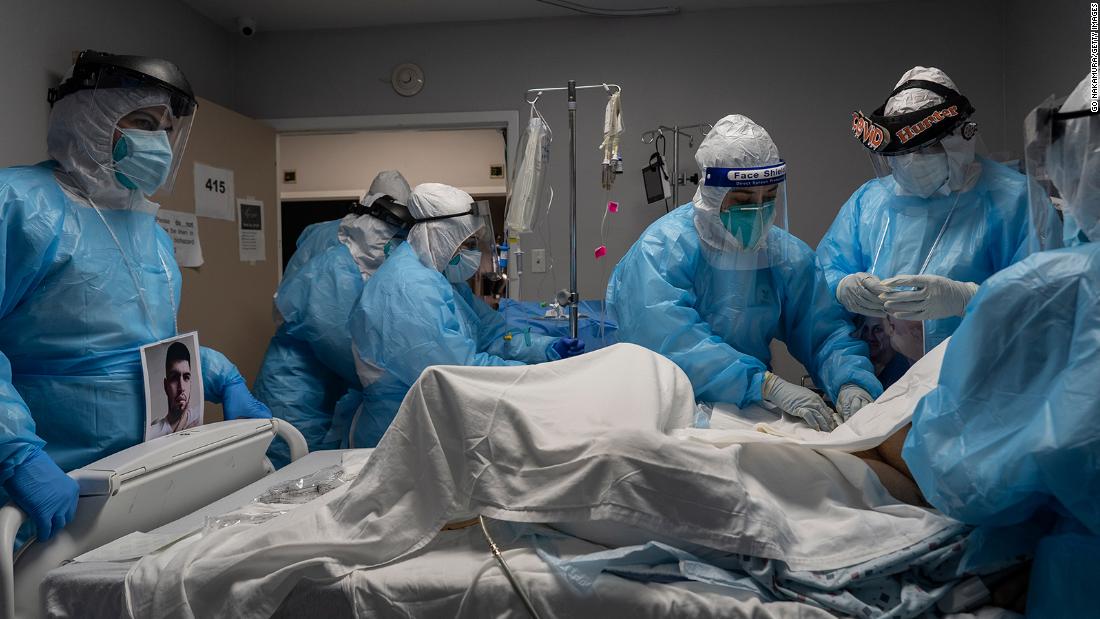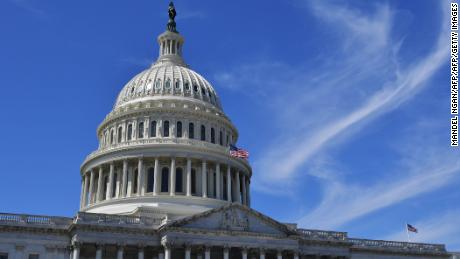The US is sliding into a limbo of alarming Covid-19 spikes and deepening economic pain with an apathetic lame duck White House and a deadlocked Congress
But even a President-elect who promises to replace Trump’s neglect with a science-based approach to the pandemic can only do so much before he takes office on January 20, when the health crisis and economic toll are likely to be far worse.
The current President spent Sunday firing off delusional new claims to bolster his fantasy that the election was stolen, which did nothing to advance his inept legal cases but further poisoned hopes of national unity when he’s gone.
Biden waits in the wings
It was left to the heads of government health agencies, some of whom were effectively muzzled by the President ahead of the election, to muster national resolve.
Since Biden has little capacity to limit the explosion in Covid-19 cases, his most critical initial task will be to preside over the distribution of a vaccine developed by private companies in coordination with the current White House.
Giroir’s confidence is encouraging. But it must be seen as another upbeat assessment from an administration that has made repeated optimistic assessments on the provision of protective equipment for front-line workers, falling death rates, expanding testing and forecasts about hospital occupancy that have all proven to be empty.
Dr. Megan Ranney, a Brown University emergency physician who has been treating Covid patients, said Sunday that political failures had brewed a disaster in the nation’s hospitals.
“We have been talking for months about the need for increased supplies of personal protective equipment, about the need for increased testing supplies, we still desperately need those,” Ranney said on CNN “Newsroom.”
“But even if those were all available, the trouble is that the surge in Covid-19 patients right now is so great, it is overwhelming hospitals, it is overwhelming available beds and worst of all, it is overwhelming the number of available staff.”
Grim warnings from top health officials
The unity of messaging from government health experts over the weekend was remarkable and ominous — and only emphasized the silence of Trump, who has repeatedly lied about the US “rounding the corner” on the crisis, or Vice President Mike Pence, who heads the White House coronavirus task force.
Giroir told CNN’s Dana Bash that he was “very concerned” about high levels of Thanksgiving travel and asked Americans to avoid high risk areas like bars and other indoors spaces.
“We’re entering into what really is a precarious situation because we’re in the middle of a steep slope,” Fauci said on NBC’s “Meet the Press.”
“I want to be straight with the American people, it’s going to get worse over the next several weeks,” he said on Fox News Sunday. “The actions that we take in the next several days will determine how bad it is or whether or not we continue to flatten our curve.”
And another senior member of the White House coronavirus task force, Dr. Deborah Birx, who said she hopes to begin briefing Biden’s team this week after a transition delayed by the President, said people who traveled for the holiday should get tested and avoid vulnerable relatives.
“To every American, this is the moment to protect yourself and your family,” Birx said on CBS’s “Face the Nation.”
Pressure mounts on Congress to avert economic devastation
With the President absent, it will fall to governors and mayors to pick up the mantle of leadership again. But a flurry of new restrictions on public gatherings and restrictions on restaurants is likely to further damage an economy that has been hammered by the pandemic.
So pressure is rising on Congress to break out of its partisan stasis and offer more help to millions of Americans who are out of work because of the pandemic.
Lawmakers will return to Washington after the holiday this week after months of the two chambers failing to pass a new and combined Covid-19 aid package. The prospects for progress still look grim with a funding deal needed to avert a partial government shutdown by December 11. In the past, however, such deadlines have sometimes spurred a modicum of political cover that allows incremental deals. Still, a more comprehensive pandemic package may have to await the arrival of the new President in January. But the reality of divided power in Washington — pending two runoffs in Georgia that will decide control of the Senate — and the likelihood that Senate Republicans will rediscover their budget hawk instincts with a Democrat in the White House, only add to Biden’s huge problems. There is also concern that the failure of Congress to act will hamper the ability of states to train workers and effectively distribute several vaccine candidates.
Biden, who will have further meetings with his transition team this week and is finally due to receive the President’s Daily Brief, is pressing ahead with building out his White House team.
Providing no evidence for his lies about the “greatest fraud in the history of our country,” the President more importantly offered no answers or responsibility for the testing days ahead in the worst domestic crisis to afflict the country since World War II.
CNN’s Jeff Zeleny contributed to this story.
![]()




